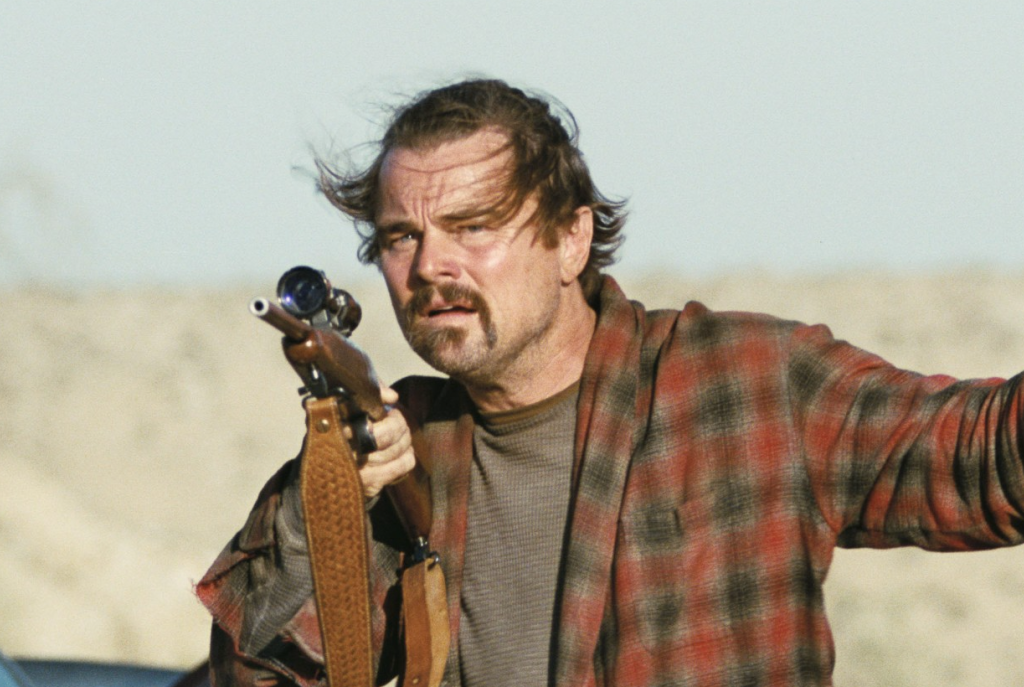It takes a talented filmmaker to comment on Our Troubled Times without descending into preachiness and pontificating, and the annals of film history are littered with ill-advised message movies from gifted directors who should have known better. (Lions for Lambs, anyone? No, seriously, anyone? I’ve got a DVD that the pawn shop won’t take.) If that were all Paul Thomas Anderson — not, in most respects, someone we’d typically think of as a political filmmaker — were up to in his new film One Battle After Another, it would be noteworthy. But there’s more to it than that; principal photography was completed in July of 2024. Anderson wasn’t commenting on our current political shitstorm; he was predicting it. He smelled it in the air, and recognized it as foul, and here we are.
However, the soothsaying of its director and screenwriter (working, very loosely, from Thomas Pynchon’s Vineland) shouldn’t serve as any kind of a deterrent to nervous viewers who are either a) looking to escape the various horrors around us, or b) not interested in what a bunch of Hollyweird liberals have to say about the state of things. Because One Battle isn’t just Paul Thomas Anderson’s most political movie to date — it’s also his most straightforward, an above-the-title star vehicle full of action set pieces, emotional resonance, and big laughs. In other words, it’s a PTA film, and it’s also a movie-movie.
It asserts its movie-ness right from the jump, in a killer opening sequence detailing a breakout of undocumented immigrants at the Otay Mesa Detention Center. The action is organized and executed by “The French 75,” a fearless revolutionary group, led by (among others) Perfidia, played with ferocity by A Thousand and One’s Teyana Taylor. She’s acutely aware that their bomb-maker Pat (Leonardo DiCaprio) has a little crush on her, and she uses that (“Make it good, make it right, impress me,” she instructs him); she also uses her sex appeal to humiliate the highest-ranking officer on duty, Col. Steven J. Lockjaw (Sean Penn), looking him right in the eye and telling him what’s what.
This entire opening section, detailing that action and several subsequent ones, is a combustible mixture of sex, violence, and revolution, orchestrated by Anderson with the kind of pop electricity he hasn’t tossed off since the first hour of Boogie Nights. But as with that film, the fun can’t last — the authorities catch up with them, bullets fly (a couple of the shock deaths here are genuinely startling), Perfidia goes into witness protection, and Pat goes underground — with their newborn daughter Charlene in tow.
Sixteen years pass, and, we’re told, “the world has changed very little.” Pat and Charlene are now Bob and Willa Ferguson (Chase Infiniti), living in Colorado, under the strain of a role-reversal dynamic; she’s like a babysitter to her burned-out dad, who has deep-fried his once-sharp brain on weed and booze. But then, out of nowhere, Col. Lockjaw and his jack-booted thugs track them down, which prompts a tantalizing question: what would you do if all your dad’s paranoid bullshit turned out to be true?
This is one of DiCaprio’s most vulnerable and touching performances of late, particularly in the dimensions he gives to the character’s frustrated father angles. Anderson has four children with his partner Maya Rudolph, the first born 20 years ago, but this is his first film that feels fully informed by fatherhood, and there’s something utterly heartbreaking about the way this helpless man despairs, “I don’t know how to do her hair right.” DiCaprio also handles the character’s numerous comic beats well; the fact that he plays most of the back half in a bathrobe makes Big Lebowski comparisons somewhat inevitable, as does the uproarious scene (featured in the trailers) when he attempts to make contact with his handlers, and cannot remember the damn passwords and spycraft in the slightest.
Infiniti, a newcomer (this is her film debut, after one television credit) is a powerhouse, delivering the character’s steeliness, warmth, cynicism, and toughness, often within the same scene, sometimes within the same moment. This is not some kind of Taken situation, the helpless daughter who must be saved; she’s a tough customer, and then, in the killer closing scenes, she’s ultimately the one who finds and defines the emotional truth between these two people.
Penn, delightfully and entertainingly, is fully unhinged; DiCaprio’s wide-eyed look of disbelief after their first encounter kinda says it all. He’s rarely a subtle actor, particularly lately, but that’s for the best here, and I frankly admire his refusal to make any piece of this character remotely likable or sympathetic. Instead, he beautifully, chillingly personifies a kind of cold-blooded sociopathic American sickness that seems all but inescapable as of late.
And that, if anything, is the twist of watching this scarily prescient picture in the fall of 2025: that certain touches that might have played like satire not too long ago — like the cabal of white supremacist power brokers in politics and business who are “dedicated to making the world safe and pure” — now feel like straightforward fact. The intensity of the dread Anderson is building throughout One Battle After Another (underlined by the merciless plinking of Jonny Greenwood’s score, the sound of an anxiety attack) is multiplied exponentially by the world it’s being unleashed in, and as we watch military men kidnapping American civilians in broad daylight, it feels pressing and urgent in a way this filmmaker’s work hasn’t before. It’s not a throwaway that we catch Bob watching The Battle of Algiers on TV, but it doesn’t feel aspirational, or hyperbolic. It simply feels that this, like that, was the movie for the moment.
A
“One Battle After Another” is in theaters this weekend.

